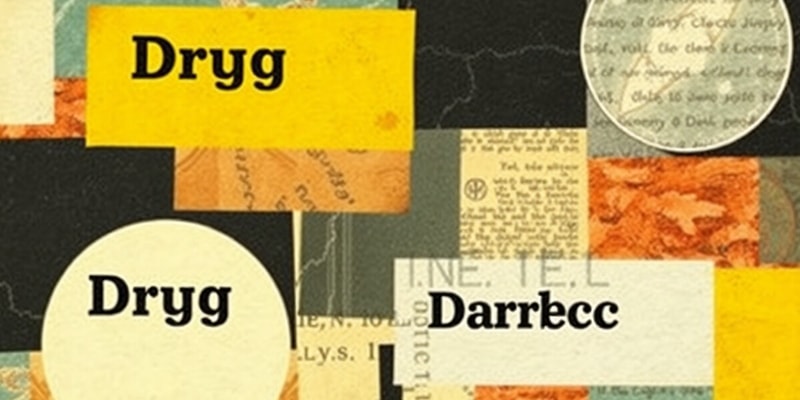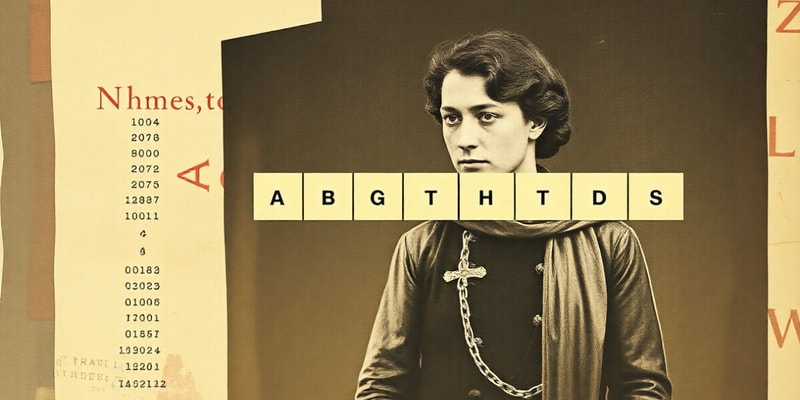Podcast
Questions and Answers
Which classification of drugs refers to their therapeutic use?
Which classification of drugs refers to their therapeutic use?
What is a common feature of non-proprietary (generic) names?
What is a common feature of non-proprietary (generic) names?
Why is it important to use proprietary names for drugs with a low therapeutic index?
Why is it important to use proprietary names for drugs with a low therapeutic index?
Which of the following is NOT a reason for promoting the use of non-proprietary names?
Which of the following is NOT a reason for promoting the use of non-proprietary names?
Signup and view all the answers
What term refers to drugs with specific commercial names owned by companies?
What term refers to drugs with specific commercial names owned by companies?
Signup and view all the answers
Which of the following examples exemplifies the use of a drug's therapeutic class in its non-proprietary name?
Which of the following examples exemplifies the use of a drug's therapeutic class in its non-proprietary name?
Signup and view all the answers
What does the use of proprietary names ensure regarding complex formulations?
What does the use of proprietary names ensure regarding complex formulations?
Signup and view all the answers
What is a common disadvantage of using proprietary names for drugs?
What is a common disadvantage of using proprietary names for drugs?
Signup and view all the answers
Which of the following endings in drug names generally indicates a benzodiazepine?
Which of the following endings in drug names generally indicates a benzodiazepine?
Signup and view all the answers
What is an advantage of using non-proprietary names in drug prescribing?
What is an advantage of using non-proprietary names in drug prescribing?
Signup and view all the answers
Study Notes
Drug Classification
- Drugs can be classified by various factors
- Therapeutic use (e.g., antimicrobial, antidiabetic, analgesic)
- Mode of action (e.g., receptor blocker, enzyme inhibitor)
- Site of action (e.g., loop diuretic, cell wall inhibitor)
- Molecular structure (e.g., glycoside, alkaloid, steroid)
Non-Proprietary Names (Generic Names)
-
Promoting regular use of generic names improves clarity
- Allows identification of drug class from name suffix
- -azepam drugs (e.g., diazepam, nitrazepam) are benzodiazepines
- -olol drugs (e.g., atenolol, metoprolol, bisoprolol) are beta-adrenergic blockers
- -pril drugs (e.g., lisinopril, enalapril) are ACE inhibitors
- -floxacin drugs (e.g., ciprofloxacin, levofloxacin) are quinolone antibacterials
- Allows identification of drug class from name suffix
-
Generic names often lead to cost savings
-
Pharmacists have more flexibility in supplying generic equivalents
Proprietary Names
- Promoting proprietary name use can enhance consistency in product quality and bioavailability, especially for drugs with a narrow therapeutic range
- Important for drugs like digoxin and warfarin, whose dosage greatly affects patients
- Necessary for specialized drugs (e.g., sustained-release formulations)
- Mixtures of drugs sometimes receive proprietary names since prescribing all ingredients is impractical
- Critical for international travelers with chronic illnesses, as proprietary names vary between countries.
Studying That Suits You
Use AI to generate personalized quizzes and flashcards to suit your learning preferences.
Description
This quiz covers the classification of drugs based on therapeutic use, mode of action, site of action, and molecular structure. Additionally, it explores the significance of non-proprietary (generic) and proprietary names in pharmacology. Test your knowledge on how these classifications impact medication clarity and cost savings.




